Polymerase Chain Reaction (PCR) Systems Market Insights: Size, Share, Growth Analysis & Forecast (2024-2029)
The report covers a comprehensive analysis segmented by Type (Conventional, qPCR, dPCR), by Product (Instrument, Reagents, Software), by Application (Genotyping, Sequencing, Gene Expression, Diagnostics), by End User (Academia, Pharma-Biotech, Others), by Geography (North America, South America, Asia Pacific, Europe, the Middle East, Africa).
Polymerase Chain Reaction (PCR) Systems Market Snapshot
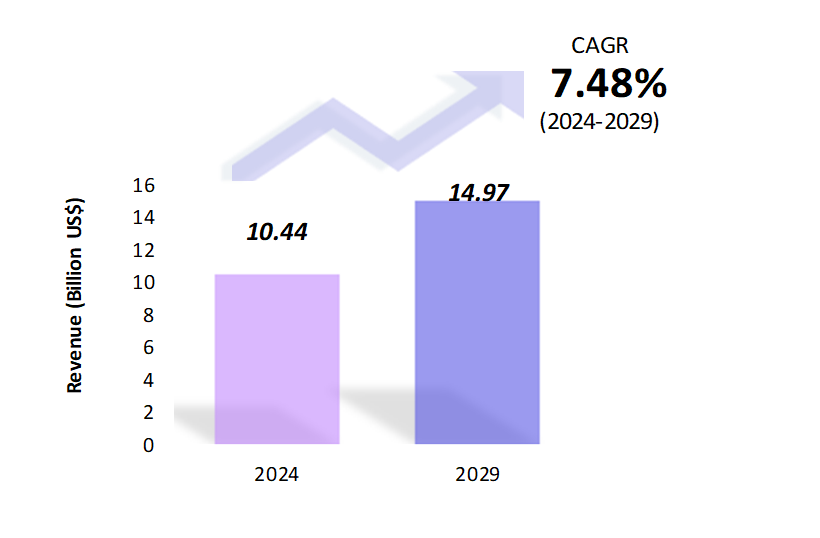
Polymerase Chain Reaction (PCR) Systems Market Overview
The global polymerase chain reaction (PCR) systems market is estimated to be at $10.44 Bn in 2024 and is anticipated to reach $14.97 Bn in 2029. The global polymerase chain reaction (PCR) systems market is registering a CAGR of 7.48% during the forecast period 2024-2029.
In the life sciences sector, the market for polymerase chain reaction (PCR) systems is a dynamic and quickly changing area, propelled by the growing need for genetic testing and molecular diagnostics in a variety of sectors. A vital instrument in the realms of forensic investigation, agriculture, research, infectious disease management, and clinical diagnostics, PCR systems play a crucial role in the amplification and interpretation of DNA and RNA sequences. Technological developments have resulted in the creation of high-throughput, automated, and user-friendly PCR platforms with improved sensitivity, specificity, and multiplexing capabilities, which are major drivers of the PCR system market.
With the addition of features like digital PCR and real-time PCR, the use of PCR systems for quantitative analysis and absolute quantification of nucleic acids has increased. Numerous firms in this market offer a wide range of goods and solutions, such as standalone PCR instruments and whole PCR workflow systems, including reagents, consumables, and software. This competitive climate fosters innovation and accelerates product development to meet the diverse needs of end customers, including clinical laboratories, research institutes, biotechnology companies, and diagnostic service providers. Geographically, the PCR system market is present throughout the world, with significant growth opportunities in developing nations due to rising healthcare spending, rising public awareness of molecular diagnostics, and growing research initiatives.
Furthermore, the COVID-19 pandemic has increased the popularity of PCR-based testing for SARS-CoV-2 identification, which is driving market expansion and innovation in rapid and point-of-care PCR instruments. All things considered, the market for PCR systems is anticipated to continue expanding as a result of technological developments, the growing demand for molecular diagnostics, and the expanding role that genetic analysis plays in customized medicine and precision agriculture. Regulatory requirements, pricing pressure, and assay standardization are some of the problems that stakeholders in the PCR system market continue to prioritize.
Polymerase Chain Reaction (PCR) Systems Market Coverage
| Historical & Forecast Period | 2018-2029 |
| Base Year | 2023 |
| Forecast Period | 2024-2029 |
| Units | Billion US$ |
| Segments | Type, Product, Application, End User |
| Geographies | North America, South America, Asia Pacific, Europe, the Middle East, Africa |
| Key Vendors |
Thermo Fisher Scientific Inc., F. Hoffmann-La Roche Ltd., Bio-Rad Laboratories, Inc., Abbott Laboratories, Takara Bio USA, Inc. |
Key Geographies of Polymerase Chain Reaction (PCR) Systems Market, 2023
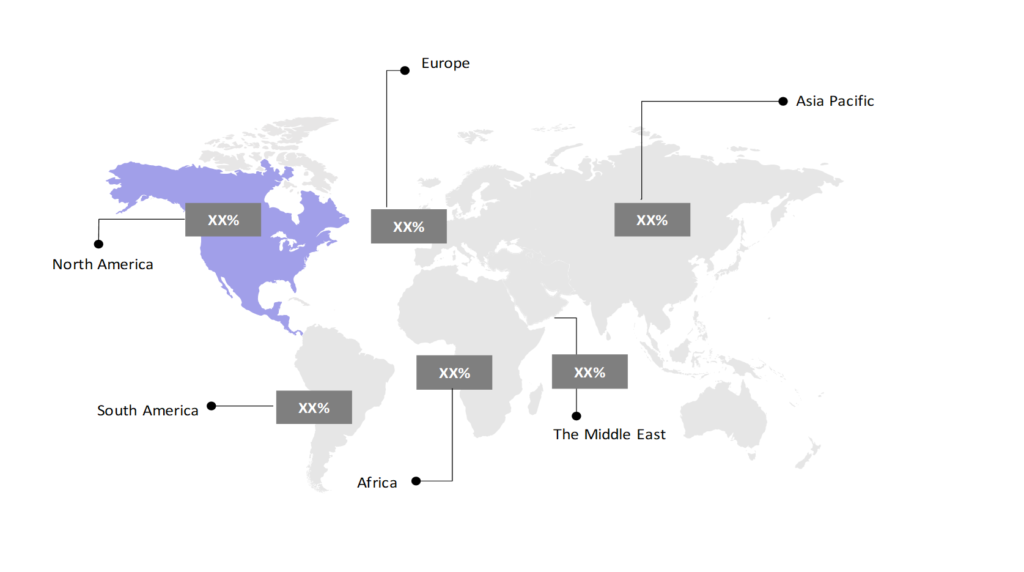
Porter’s 5 Forces Analysis of Polymerase Chain Reaction (PCR) Systems Market
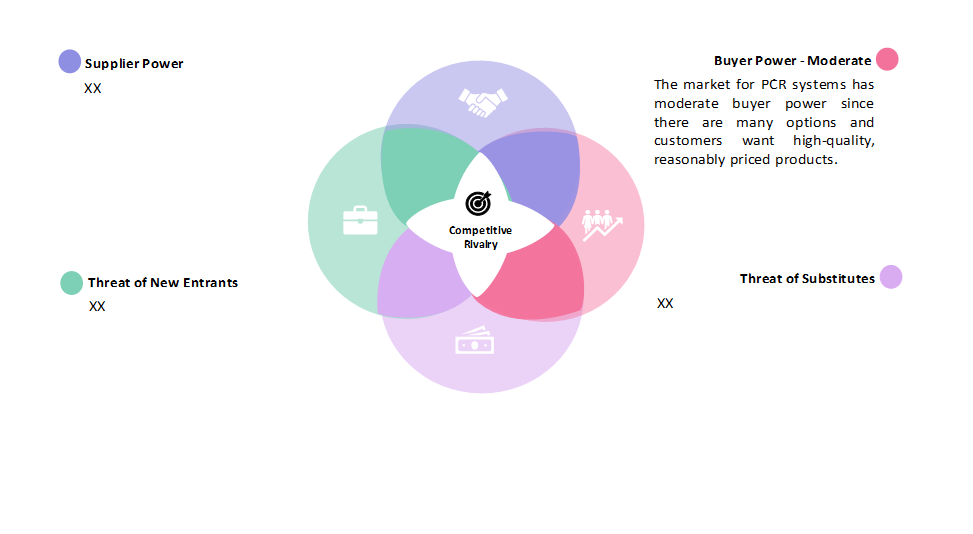
Polymerase Chain Reaction (PCR) Systems Market Trends
The growing need for genetic testing and diagnostics and developments in molecular biology techniques, the market for polymerase chain reaction (PCR) systems has grown and changed significantly. Numerous industries, including forensics, research, agriculture, and medical diagnostics, heavily rely on PCR technology. The shift toward automated and high-throughput PCR systems is one significant development in the PCR system market. Automation reduces human error, boosts productivity, and allows processing of multiple samples simultaneously, meeting the increasing demand for faster and higher throughput testing in clinical and research contexts.
The incorporation of innovative features into PCR systems, such as digital and real-time PCR capabilities, is one such development. While digital PCR offers absolute measurement of target DNA molecules with improved sensitivity and precision, real-time PCR permits the observation of amplification in real-time, facilitating quantitative analysis. Additionally, the industry is witnessing a surge in the utilization of portable and point-of-care PCR apparatus, which facilitates prompt on-site testing for food safety, environmental surveillance, and infectious disease identification. These technologies offer accessibility, speed, and convenience, especially in resource-constrained areas and during emergencies like pandemics.
A growing focus on developing PCR techniques with enhanced multiplexing, sensitivity, and specificity is also being made to satisfy the need for more accurate and comprehensive genetic analysis. Globally, there is an increasing need for genetic testing and molecular diagnostics, especially in areas such as agricultural biotechnology, customized medicine, and infectious disease control. Consequently, it is expected that the market for PCR systems would keep expanding.
Polymerase Chain Reaction (PCR) Systems Market Driving Factors
The market for polymerase chain reaction (PCR) systems has been growing and changing over the years due to several principal factors. One of the primary causes is the expanding demand for molecular diagnostics across numerous industries, including forensics, research, healthcare, and agriculture. PCR systems play a vital role in the detection and analysis of genetic material, making them indispensable tools for genetic testing, disease diagnosis, and research applications. The efficiency, precision, and throughput of PCR systems have been increased by technological developments, propelling the market’s expansion. The integration of real-time PCR and digital PCR capabilities has revolutionized genetic analysis by enabling quantitative and absolute quantification of nucleic acids with high sensitivity and specificity. The application of PCR systems has increased in domains including gene expression analysis, mutation detection, and infectious disease tracking thanks to their sophisticated features.
Furthermore, automation and miniaturization have emerged as key drivers in the PCR system market, allowing for the development of high-throughput and portable systems. For clinical labs and research facilities handling high volumes of samples, automated PCR platforms eliminate the danger of contamination, expedite workflows, and cut down on hands-on time. Rapid and on-site testing capabilities are provided by portable PCR systems, meeting the increasing need for point-of-care diagnostics, particularly in rural or resource-constrained environments. The growing prevalence of genetic disorders, cancer, and infectious diseases has led to a greater need for PCR-based diagnostic tests and customized treatment approaches, which is driving the market’s growth.
Therefore, growing applications of PCR systems in agricultural biotechnology have created new avenues for industry expansion. Given the conditions, it is anticipated that the market for polymerase chain reaction (PCR) systems will continue to increase as a result of technological advancements, expanding applications, and the growing demand for molecular diagnostics across a range of industries.
Polymerase Chain Reaction (PCR) Systems Market Challenges
Despite its widespread application and quick growth, the polymerase chain reaction (PCR) systems market is confronted with a number of challenges. The complexity and expense of PCR equipment, especially the more expensive and high-end ones with sophisticated features like digital and real-time PCR, is one of the main obstacles. Due to their initial excessive cost, PCR equipment and reagents may be out of reach for smaller labs and research organizations with more limited funding. The possibility for PCR inhibitors to obstruct the amplification process, producing false-negative results or decreased test sensitivity, is another challenge.
A multitude of variables, including PCR reagents, contaminants, and sample types, can introduce inhibitors. Because of this, testing may become challenging and unreliable, particularly when working with intricate biological samples or environmental matrices. Furthermore, a wide range of products and technologies are offered by numerous rivals in the PCR system market, making it an extremely competitive space. Profit margins for producers and distributors may be impacted by price pressure and commoditization brought on by this rivalry, particularly for common PCR equipment and reagents.
As a result, PCR-based diagnostics still have problems with assay validation, standardization, and optimization. It can be challenging to ensure assay robustness, accuracy, and reproducibility across platforms and laboratories for clinical and research applications due to variations in processes, tools, and sample-handling approaches. Regulations and quality control requirements also provide challenges for PCR system manufacturers and users, particularly in the areas of clinical diagnostics and regulatory approval procedures. Regulatory compliance and quality control requirements add complexity and expenses to the process of developing new products and bringing them to market. Addressing these challenges will be essential for unlocking the full potential of PCR-based diagnostics and expanding their applications in healthcare, research, and other industries.
Polymerase Chain Reaction (PCR) Systems Market – Key Industry News
- In February 2023, Huwel Lifesciences, a Hyderabad-based company in India has introduced a small real-time polymerase chain reaction (RT PCR) machine that can test distinct types of viruses. The PCR can be set up at any place and it takes 30mins to complete the test.
- In May 2023, Menarini Diagnostics announced the commercial launch of its PRIME MDx platform, a sample-to-result, all-in-one, fully automated molecular diagnostics platform for the processing of various testing portfolios through real-time PCR.
- In December 2023, Biotechnology company Anitoa Systems has launched the Anitoa MAx16, an automation-ready real-time polymerase chain reaction (qPCR) modular system, that can be easily integrated into a compact desktop robotic fluid handling automation system.
Polymerase Chain Reaction (PCR) Systems Market Competitive Landscape
The polymerase chain reaction system market is highly competitive and it is marked by the presence of many prominent players competing for a larger market share. The participants in the global polymerase chain reaction (PCR) systems industry are always developing their strategies to preserve a competitive advantage. Companies primarily use acquisitions, R&D, partnerships, and technological launches. Several important entities in the polymerase chain reaction (PCR) systems market include Thermo Fisher Scientific Inc., F. Hoffmann-La Roche Ltd., Bio-Rad Laboratories, Inc., Abbott Laboratories, Takara Bio Inc., and others.
These companies dominate the market with their extensive product portfolios, technological advancements, and robust distribution networks. The market is witnessing a constant influx of new entrants, intensifying competition further. The competitive landscape of the PCR market is greatly influenced by factors like product quality, price tactics, regulatory compliance, and customer service.
Polymerase Chain Reaction (PCR) Systems Market Company Share Analysis, 2023(%)

Polymerase Chain Reaction (PCR) Systems Market – Key Companies
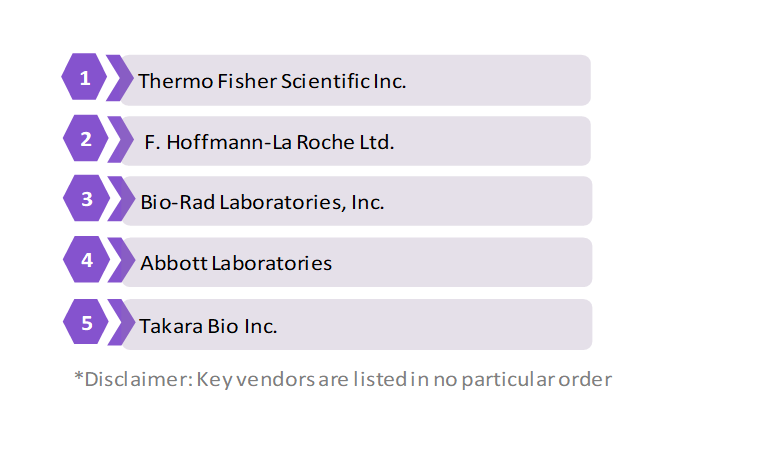
Reason to Buy from us
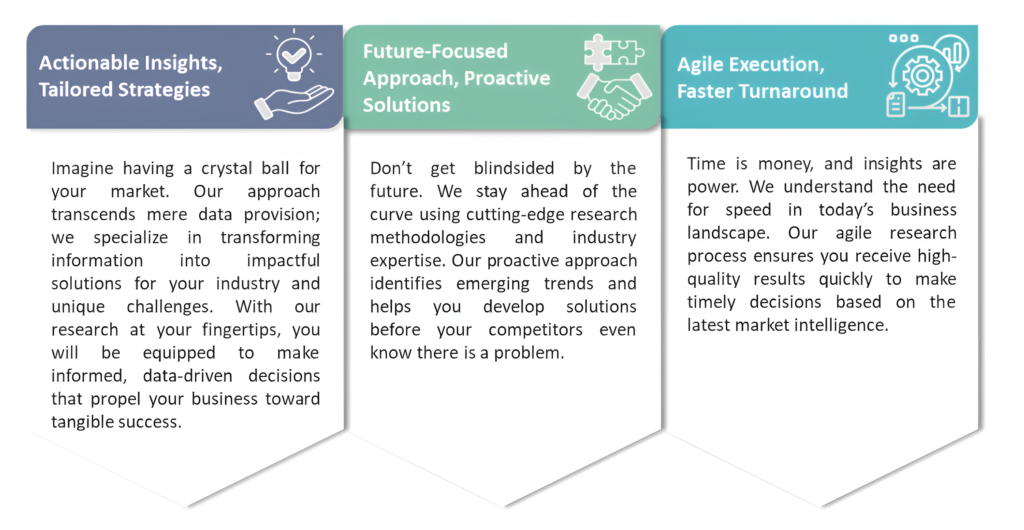
Table of Contents
| 1. Introduction |
|---|
| 1.1. Research Methodology |
| 1.2. Scope of the Study |
| 2. Market Overview / Executive Summary |
| 2.1. Global Polymerase chain reaction (PCR) systems Market (2018 – 2022) |
| 2.2. Global Polymerase chain reaction (PCR) systems Market (2023 – 2029) |
| 3. Market Segmentation |
| 3.1. Global Polymerase chain reaction (PCR) systems Market by Type |
| 3.1.1. Conventional |
| 3.1.2. qPCR |
| 3.1.3. dPCR |
| 3.2. Global Polymerase chain reaction (PCR) systems Market by Product |
| 3.2.1. Instrument |
| 3.2.2. Reagents |
| 3.2.3. Software |
| 3.3. Global Polymerase chain reaction (PCR) systems Market by Application |
| 3.3.1. Genotyping |
| 3.3.2. Sequencing |
| 3.3.3. Gene Expression |
| 3.3.4. Diagnostics |
| 3.4. Global Polymerase chain reaction (PCR) systems Market by End User |
| 3.4.1. Academia |
| 3.4.2. Pharma-Biotech |
| 3.4.3. Others |
| 4. Regional Segmentation |
| 4.1. North America |
| 4.1.1. The U.S |
| 4.1.2. Canada |
| 4.1.3. Mexico |
| 4.2. South America |
| 4.2.1. Brazil |
| 4.2.2. Argentina |
| 4.2.3. Colombia |
| 4.2.4. Chile |
| 4.2.5. Rest of South America |
| 4.3. Asia Pacific |
| 4.3.1. China |
| 4.3.2. India |
| 4.3.3. Japan |
| 4.3.4. South Korea |
| 4.3.5. Rest of Asia Pacific |
| 4.4. Europe |
| 4.4.1. UK |
| 4.4.2. Germany |
| 4.4.3. Italy |
| 4.4.4. France |
| 4.4.5. Spain |
| 4.4.6. Rest of Europe |
| 4.5. The Middle East |
| 4.5.1. Turkey |
| 4.5.2. UAE |
| 4.5.3. Saudi Arabia |
| 4.5.4. Rest of the Middle East |
| 4.6. Africa |
| 4.6.1. Egypt |
| 4.6.2. South Africa |
| 4.6.3. Rest of Africa |
| 5. Value Chain Analysis of the Global Polymerase chain reaction (PCR) systems Market |
| 6. Porter Five Forces Analysis |
| 6.1. Threats of New Entrants |
| 6.2. Threats of Substitutes |
| 6.3. Bargaining Power of Buyers |
| 6.4. Bargaining Power of Suppliers |
| 6.5. Competition in the Industry |
| 7. Trends, Drivers and Challenges Analysis |
| 7.1. Market Trends |
| 7.1.1. Market Trend 1 |
| 7.1.2. Market Trend 2 |
| 7.1.3. Market Trend 3 |
| 7.1.4. Market Trend 4 |
| 7.1.5. Market Trend 5 |
| 7.2. Market Drivers |
| 7.2.1. Market Driver 1 |
| 7.2.2. Market Driver 2 |
| 7.2.3. Market Driver 3 |
| 7.2.4. Market Driver 4 |
| 7.2.5. Market Driver 5 |
| 7.3. Market Challenges |
| 7.3.1. Market Challenge 1 |
| 7.3.2. Market Challenge 2 |
| 7.3.3. Market Challenge 3 |
| 7.3.4. Market Challenge 4 |
| 7.3.5. Market Challenge 5 |
| 8. Regulatory Landscape |
| 9. Competitive Landscape |
| 9.1. Thermo Fisher Scientific Inc. |
| 9.2. F. Hoffmann-La Roche Ltd. |
| 9.3. Bio-Rad Laboratories, Inc. |
| 9.4. Abbott Laboratories |
| 9.5. Takara Bio USA, Inc. |
| 9.6. Company 6 |
| 9.7. Company 7 |
| 9.8. Company 8 |
| 9.9. Company 9 |
| 9.10. Company 10 |
Polymerase Chain Reaction (PCR) Systems Market – Frequently Asked Questions (FAQs)
What is the current size of the global polymerase chain reaction (PCR) systems market?
The market size for the global polymerase chain reaction (PCR) systems market in 2024 is $10.44 Bn.
Who are the major vendors in the global polymerase chain reaction (PCR) systems market?
The major vendors in the global polymerase chain reaction (PCR) systems market are Thermo Fisher Scientific Inc., F. Hoffmann-La Roche Ltd., Bio-Rad Laboratories, Inc., Abbott Laboratories, Takara Bio USA, Inc.
Which segments are covered under the global polymerase chain reaction (PCR) systems market segments analysis?
This report offers in-depth insights into each by type, product, application, end user.
